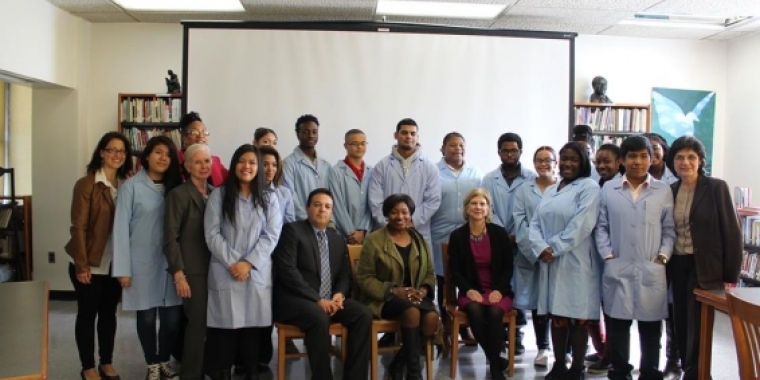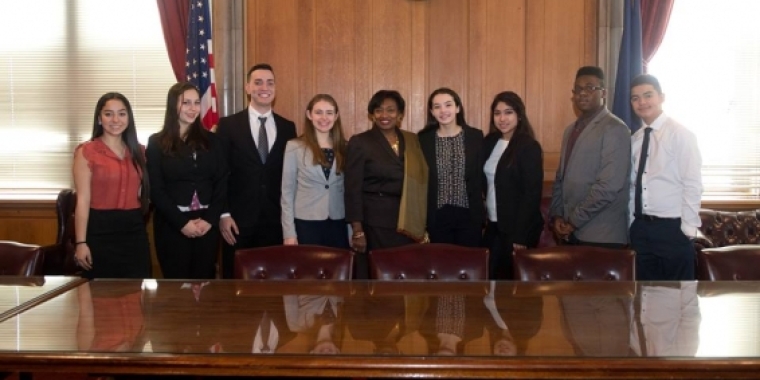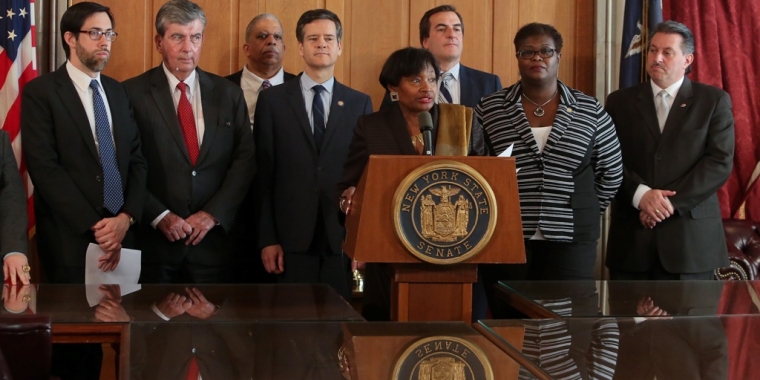
Letter to Public Service Commission About Tree Trimming Policies
Andrea Stewart-Cousins
February 3, 2011
-
ISSUE:
- Energy
- Environment
- Electricity
Thank you for this opportunity to comment on the Public Service Commission (PSC) Staff’s Recommendations regarding Case 10-E-0155. I would also like to thank you for opening this review, and for affording the public a high level of involvement in the process. As stated in my original comments, I recognize that vegetation management practices are necessary to maintain a safe and reliable electric utility system. However, changes to Public Service Commission policies for utility companies engaging in this work are necessary to improve public involvement and reflect greater concern for the environment and quality of life. To that end, it is my belief that the PSC staff’s recommendations do not go far enough in addressing the concerns of affected residents. While the recommendations are a good starting point for changes to PSC policies, improvements should be made with regard to notification, public involvement, and accountability.
It is clear that the recommendations acknowledge the need for better notification of vegetation management along transmission lines. They even provide a time frame by which utility companies must inform the public of the proposed plans. However, this time frame allows for the utility to hold off on notification until three weeks prior to the commencement of vegetation management work. This is not a sufficient time frame. Legislation that I introduced this session (S. 1632), calls for at least 60 days prior notice of vegetation management work in the affected communities of Westchester. This ensures that the public is properly informed of the scope and nature of the proposals, and leaves enough time for residents to study the effects on their properties and neighborhoods. One of the most significant complaints about Con Edison’s vegetation management work in Westchester County last year was that residents were not properly notified of the utility company’s plans. Further, the recommendations do not require public notification in the event that a utility company drastically changes their plans after releasing their initial proposals. Guidelines should exist to detail the types of changes that would require notification as well as a mechanism and time frame to inform the public. It is important that the Public Service Commission’s policies reflect the need for proper notification of affected residents under these circumstances.
The recommendations also neglect to address the need for public input. Another, noteworthy complaint from last year’s vegetation management work in Westchester was that residents had no chance to provide feedback to Con Edison until the work had already begun. The current recommendations allow for this practice to continue, leaving no opportunity for residents to air their concerns in a public setting. One of the key components of my legislation calls for the utility company in Westchester County to hold a public meeting at least 30 days prior to the commencement of vegetation management work. This would provide an important forum for residents to comment on the proposals, and create a level of accountability for the utility company that currently does not exist. Since it is clear that vegetation management can have a broad effect on the quality of life for entire communities, the PSC should, at the very least, provide a vehicle by which public can participate in the process.
Another shortcoming of the PSC staff’s recommendations is the lack of repercussions for utilities who do not comply with the notification requirements. My legislation sets forth a $5,000 fine for utility companies in Westchester who do not properly notify the public or hold public meetings, and a $10,000 fine for the second offense. Also, there are no repercussions for companies who perform work that goes beyond the plans that they had released to the public. While the recommendations do call for companies to submit changes to their plans to PSC staff prior to implementation, there is no indication of a penalty should the company fail to do so. The Public Service Commission should include such measures to ensure that utilities abide by their regulations.
Finally, I would suggest that the Public Service Commission use their conduct in this review as a model for their policies towards utility companies. Throughout this process, the PSC has been very effective at communicating and notifying the public of their progress. It has been a highly inclusive review, which has consisted of hearings throughout the state, and requests for public comment at every step of the way to make sure that residents with suggestions on PSC policy have the opportunity to be heard. The Public Service Commission, and it’s staff, should be commended for the way they have operated this review, but we should hold utility companies to a similar standard, to ensure fair and adequate participation among residents who will be affected by vegetation management work in the future.
Once again, thank you for opening this review and for allowing me to submit my comments on the Public Service Commission staff’s recommendations. Overall, the recommendations are a good first step towards providing the public with the notification and involvement that they deserve, should electric utility companies engage in vegetation management in their communities. However, there are a few steps that the Public Service Commission should take which will better serve residents affected by this work, and still balance the need for maintaining a safe and reliable electric utility system. Thank you again, and I look forward to the outcome of this review. Should you have any further questions, please do not hesitate to contact me at my Community Office.
Sincerely,
Andrea Stewart-Cousins
New York State Senator
35th District
Share this Article or Press Release
Newsroom
Go to NewsroomGorton High School Smart Scholar Students
February 22, 2016

Paid Family Leave Rally
February 17, 2016

Westchester Youth Council Leadership Conference
February 10, 2016

